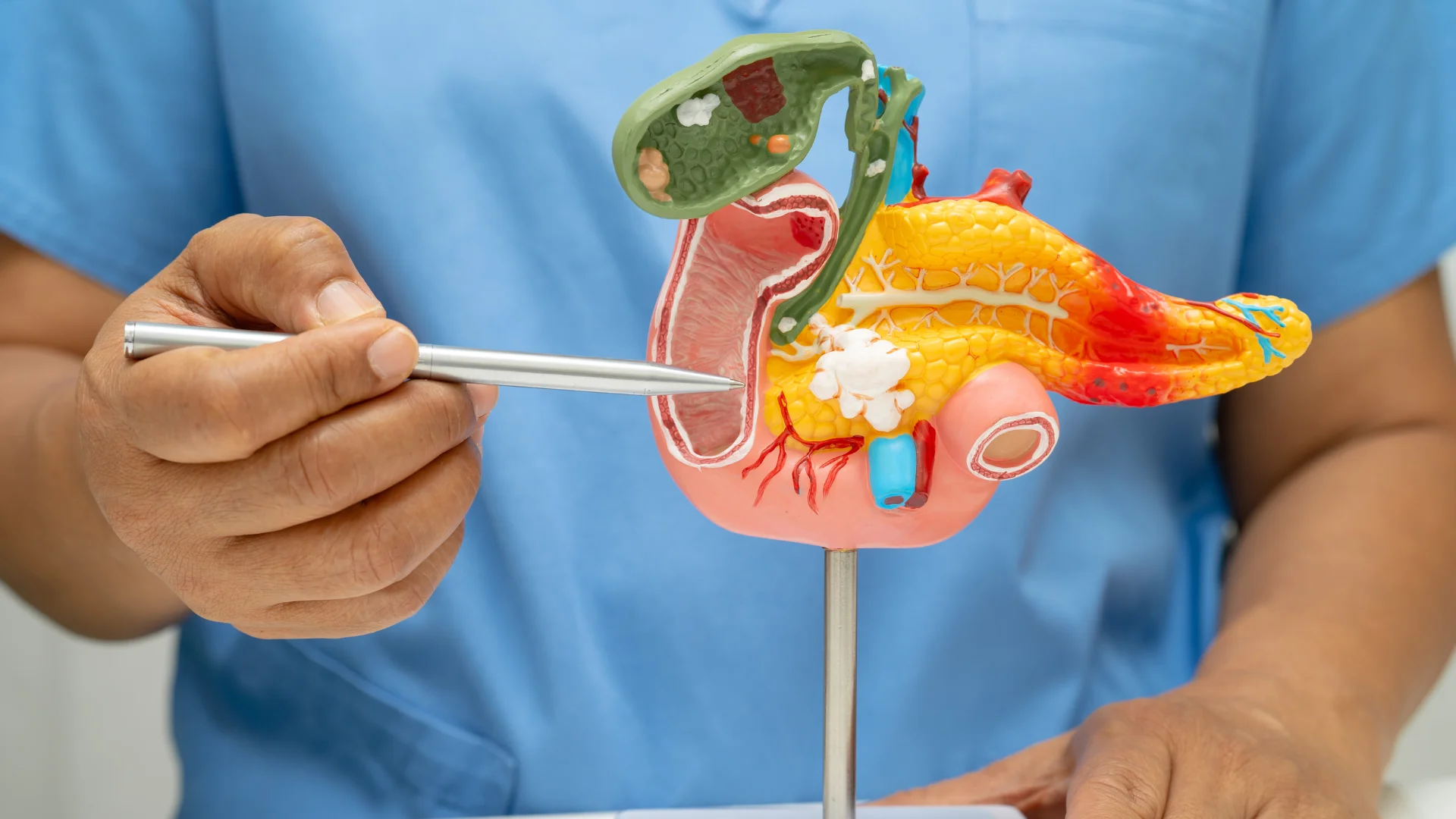
Chronic Pancreatitis: What It Is and How to Manage It 🔄
The pancreas is an important gland in your digestive system that:
- Produces enzymes to help break down food.
- Releases hormones, like insulin, into your blood to regulate sugar levels.
When the pancreas becomes damaged over time, it can lead to chronic pancreatitis. This long-term condition causes permanent changes in the pancreas, affecting its ability to function properly. Unlike acute pancreatitis, which comes on suddenly and can be life-threatening, chronic pancreatitis develops gradually and can have lasting effects.
What Causes Chronic Pancreatitis? 🤔
There are several factors that may lead to chronic pancreatitis, including:
- Long-term alcohol use. 🍷
- Smoking. 🚬
- High levels of calcium or fats in the blood. 🧈
- Chronic conditions like kidney disease. ⚠️
- Blockages in the pancreatic ducts. ⛔
- Poor nutrition or malnutrition. 🍩
- Autoimmune diseases or inherited genetic conditions. 🧬
- In some cases, the cause remains unknown. 😨
What Are the Complications? 👀
Chronic pancreatitis can lead to serious health issues, such as:
- Pseudocysts: Fluid-filled sacs that may disappear on their own or press on nearby organs.
- Diabetes: Damage to the pancreas can affect insulin production.
- Blockages in the digestive system, like narrowing of the duodenum (the first part of the small intestine).
- Fistulas: Abnormal connections between the pancreas and other organs or the skin.
- Blood vessel problems, such as bulging (pseudoaneurysms) or clots (splenic vein thrombosis).
- Increased risk of pancreatic cancer, especially with long-term inflammation.
What Are the Symptoms? 🔍
The most common symptom of chronic pancreatitis is abdominal pain, which is experienced by more than 80% of people with the condition:
- Pain usually starts in the upper stomach and can radiate to the back. 😣
- It is often constant and tiring, sometimes worsening 15-30 minutes after eating.
- Leaning forward may provide temporary relief.
Other symptoms include:
- Nausea and vomiting, often accompanying the pain. 🤮
- Weight loss, which may happen because:
- The pancreas isn’t producing enough enzymes to properly digest food, causing diarrhea or nutrient malabsorption.
- Diabetes develops.
- People may eat less to avoid triggering pain.
- The stomach empties slowly, leading to a feeling of fullness.
How Is It Diagnosed? 🩺
If chronic pancreatitis is suspected, doctors use a mix of tests to confirm the diagnosis:
- Imaging tests: Ultrasound, CT scans, or MRIs to check for structural changes in the pancreas.
- Endoscopic procedures: Techniques like ERCP (using a small camera) to examine pancreatic ducts.
- Lab tests:
- Blood tests to check for elevated pancreatic enzymes and blood sugar levels.
- Stool tests to detect fat malabsorption.
- Tests for pancreatic tumor markers to rule out cancer.
How Is It Treated? 🏥
While there’s no cure for chronic pancreatitis, treatments can help manage symptoms and prevent complications. Some examples include:
Symptom Management
- Pain relief with medications prescribed by your doctor.
- Enzyme supplements to help your body digest food properly.
- Acid-reducing medications to ease digestive discomfort.
- Vitamin supplements to address deficiencies caused by poor absorption.
- Antibiotics, if there’s an infection.
Treating Complications
- Minimally invasive procedures, like draining fluid-filled cysts.
- Surgery, in more severe cases, to address blockages or remove damaged tissue.
How Can You Prevent Chronic Pancreatitis? 🛡️
While you can’t always avoid pancreatitis, you can reduce your risk by making healthy lifestyle choices:
- Avoid alcohol and tobacco use. 🚭🚫🍷
- Eat a balanced diet with minimal animal fats, refined carbs, and processed foods. Focus on fruits, vegetables, and lean proteins. 🥝🍅🥥
- Stay physically active with regular exercise. 🤸♂️⛹️♀️🚴♂️
- Manage stress through mindfulness or relaxation techniques. 🧘♀️🌞🌳
- If you experience persistent stomach pain, especially if you drink or smoke, see a gastro-hepatologist early. 👨⚕️
Final Thoughts ✨
Chronic pancreatitis can be a challenging condition, but with the right care and lifestyle adjustments, you can manage symptoms and maintain your quality of life. If you’re experiencing symptoms or are at risk, don’t wait—talk to a doctor to get the help and guidance you need.
🩺 Explore out our Check-Up Programs!
📅 Book your appointment now!
DISCLAIMER:
The information presented on this page has been intentionally condensed and simplified to make it accessible and easier to understand for the general audience. Its purpose is solely to provide basic awareness and education on the topic discussed. It is important to note that this content is not exhaustive and does not replace or serve as a substitute for professional medical advice, diagnosis, or treatment. Readers are strongly advised to seek consultations with qualified healthcare professionals or specialists for accurate assessment, personalized guidance, and appropriate medical care. Relying solely on the information provided here, without professional oversight, may lead to misunderstandings or inadequate treatment.
